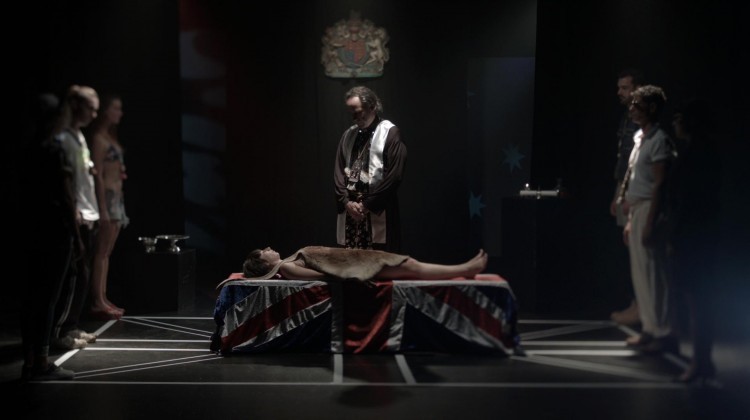National Reconciliation Week - Indigenous Short Film Screening

Malaysian Theatre, Melbourne School of Design (MSD), University of Melbourne, Parkville Campus
MapImage: Megan Cope, The Blacktism, video still, 2014.
As part of the New Student Precinct Project and Next Wave Partnership, Next Wave will present a screening of Indigenous films over three evenings sourced from the Victorian College of the Arts (VCA) digitised collection, as well as several other independent Indigenous film makers and collectives.
This program presents a variety of moving image works by First Nations artists and filmmakers. Using strategies ranging from satire, re-enactment, documentation, humour and experimentation, we invite audiences to join us to pay our respects and celebrate the vibrancy, dynamism and resilience of First Nations people and culture. These films and single channel video works explore issues ranging from historical and present-day exploitation, dispossession, violence and intergenerational trauma; the ongoing legacies of colonial fantasies and stereotypes; cultural identity; and the struggle for sovereignty.
Aboriginal and Torres Strait Islander viewers are advised that these works may contain images and voices of people who have died.
Screening Program
BabaKiueria by Don Featherstone, 1986, 29 mins (courtesy of ABC)
In an ethnographic mockumentary style, presenter Michelle Torres investigates white lives in the fictitious land of BabaKiueria, where white people are a minority, living under black laws and suffering from discriminatory practices and attitudes held by the black majority.
Mimi by Warwick Thornton, 2002, 13 mins (courtesy of Flickerfest_
Mimi pokes fun of both white and Aboriginal stereotypes and the commodification of Indigenous art. David Gulpilil stars alongside Aaron Pedersen and Sophie Lee.
The Blaktism by Megan Cope, 2014, 17 mins (courtesy of the artists and THIS IS NO FANTASY + dianne tanzer gallery)
The Blaktism is a satirical new media work about the artists’ recent experience obtaining her 'Certificate of Aboriginality' and the overwhelming sense of doubt experienced at the thought of being legitimately certified at 30 years of age. The video presents a baptism like sacred ceremony whereby a young Quandamooka woman receives the rite to her authentic Aboriginality permitted by everyday Australians. This work translates issues of citizenship, power, prejudice and interrogates issues on cultural authority in 21st century Australian political and cultural landscape.
Vote Yes by Nick Waterman, 2013, 11 mins (courtesy of Flickerfest)
It’s May 27, 1967 – Australia’s referendum on Aboriginal rights. Two women unite as a family come to terms with the prospect of change. Starring Miranda Tapsell (The Sapphires).
Night Time Go by Karrabing Film Collective, 2017, 13 mins
Night Time Go is an exploration of the Australian settler state’s attempt to remove Indigenous people from their lands during the Second World War, and the refusal of the Karrabing ancestors to be detained. The film begins by hewing closely to the actual historical details of a group that escaped from an internment camp in 1943, but slowly turns to an alternative history in which the group inspires a general Indigenous insurrection that drives out settlers from the Top End of Australia.
Hunting Ground (Haunted) Van Diemen’s Land by Julie Gough, 2016-17, 13 mins
In Hunting Ground (Haunted) Van Diemen’s Land Julie Gough searches for the places that match the few written accounts of violent attacks on Aboriginal people in Van Diemen’s Land by colonists in the first 35 years post invasion. The artist places etched and silkscreened text ‘posters’ relating 10 from the multitudes of these murderous encounters. The resulting film is an articulation of otherwise, usually hidden histories; a demonstration of our island as a crime scene; and a record of Gough’s reconnection with these places, establishing there, en site, that we continue, were not entirely annihilated, and that we remember.
Visit the National Reconciliation Week 2018 website or a full program of National Reconciliation Week Events at the University of Melbourne.